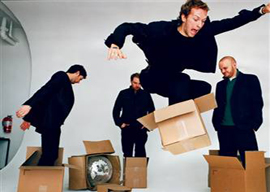
September 09, 2012

Coldplay looking "gay"
Many of us who recall the phrase from youth were surprised to see it making headlines again over the past few years. In 2007, California school authorities disciplined a Mormon schoolgirl because she used the dreaded phrase “that’s so gay” in retaliation against peers who teased her about her religion. Her parents subsequently filed a lawsuit on First Amendment grounds, which they lost. In 2010, Anderson Cooper had his crinoline petticoats all twisted because of a movie trailer in which comic actor Vince Vaughn uttered these menacingly hateful lines:
Electric cars are gay. Not homosexual gay, but my-parents-are-chaperoning-the-dance gay.
Cooper denounced the dialogue as “unacceptable” and huffed and puffed like some PC version of an affronted Victorian damsel hearing the word “testicles” spoken in public. But apparently Vince Vaughn and his screenwriter are a good deal more clever and astute than Cooper, because the joke’s point is that “gay” has two meanings in contemporary parlance””homosexual” and “uncool.” By drawing attention to the distinction, the joke is by definition not “homophobic,” a subtlety apparently lost on Cooper in his rush to be righteously outraged.
I don”t recall anybody in high school ever being brought up on hate-speech charges when they described a homework assignment or a lunch-hour detention as being “gay.” In college, I can recall even openly gay students who would often, and without self-conscious irony, use the term “gay” as a good-humored way to deride things they found trite or ineffectual.
So what changed? Did the nineties, that monumentally dreary decade of identity politics and Kurt Cobain and women in army boots, turn everybody so hysterically sensitive to language that we can no longer even distinguish between two basically unrelated meanings of a commonly used word? (And when did the homosexual community gain exclusive rights over the term “gay,” anyhow? After all, they stole it from the happy community.) Slang, especially youth slang, is as natural and uncontrollable a phenomenon as the weather”how is it possible to police such a thing, assuming policing it is even desirable?
The Totalitarianism Lite crowd who sternly use words such as “eliminate” and “eradicate” regarding disapproved language may have a tough time with this one. Some slang terms disappear, forever to be derisively consigned to history’s dustbin, while others seem to keep coming back into fashion, and “gay” appears to be one of the latter. Calling certain things “gay” just feels right, and more establishment options such as “insipid” or “weak” look, well, insipid and weak in comparison.
Imagine two hypothetical conversations:
VERSION ONE
Q: Do you like the band Coldplay?
A: No, I find their music distastefully fey, tacky, insipid, and uninspiring, lacking in both energy and forcefulness to a degree that I find quite off-putting. They”re a bland and mainstream group whose artistic vision is, from my perspective, singularly limited and unoriginal.
VERSION TWO
Q: Do you like the band Coldplay?
A: No, their music is totally gay.
Which response might strike a young adult as being more evocative and succinct?
Somebody should tell the people behind the University of Michigan study that being totalitarian, self-righteous, and priggish about language is, all things considered, pretty gay. That’s electric-cars, parents-chaperoning-the-dance gay, assuming they can even understand the difference.